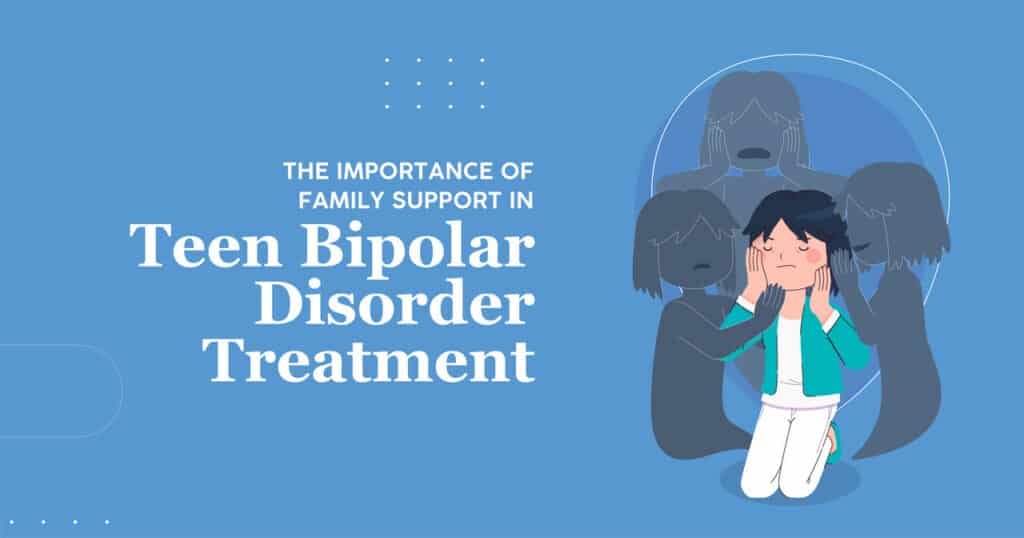Introduction
Navigating the tumultuous waters of teen bipolar disorder can be daunting for both the young person affected and their family. But it’s not a journey that has to be undertaken alone. Family support is an anchor, providing stability, understanding, and crucial reinforcement throughout treatment. This in-depth exploration highlights why family involvement is not just beneficial but essential in managing teen bipolar disorder effectively. From understanding the disorder’s dynamics to implementing practical support strategies, this guide underscores the transformative power of familial support in ensuring successful treatment outcomes.
Understanding Teen Bipolar Disorder
Before diving into the nuances of family support, it’s crucial to grasp what teen bipolar disorder entails and how it impacts daily life.
Defining Bipolar Disorder in Teens
- Characteristics: In teenagers, bipolar disorder is characterized by dramatic mood swings, fluctuating between manic highs and depressive lows, impacting thoughts, emotions, actions, and daily functioning.
- Diagnosis Challenges: The symptoms in teens might be more erratic compared to adults, making accurate diagnosis and effective management exceptionally challenging.
The Impact on Daily Life
- School Challenges: Mood swings can severely affect academic performance and social interactions.
- Family Dynamics: Without understanding and proper management, the disorder can strain relationships within the family.
The Role of Family in Bipolar Disorder Management
The involvement of family members in treatment can dramatically improve the management of bipolar disorder in teenagers.
Emotional Support and Stability
- Understanding and Acceptance: Families that strive to understand bipolar disorder can provide a more empathetic and supportive environment.
- Consistency and Routine: Helping maintain a routine can stabilize mood swings and provide a sense of security.
Advocacy and Treatment Adherence
- Medical Advocacy: Family members can advocate for their teen during medical appointments, addressing their needs and concerns.
- Encouraging Treatment Adherence: Families play a crucial role in encouraging teens to stick to their treatment plans, which is vital for managing the disorder effectively.
Strategies for Enhancing Family Support
Adequate family support involves understanding the disorder and actively contributing to the treatment process.
Educating the Family
- Learning Together: Families should educate themselves about bipolar disorder through books, reputable online resources, and participation in workshops. This knowledge is crucial in reducing stigma and enhancing understanding.
- Family Therapy: Engaging in family therapy can educate members about the disorder and teach effective communication and support strategies.
Creating a Supportive Home Environment
- Open Communication: Foster an atmosphere where emotions and concerns can be freely shared without fear of judgment.
- Stress Reduction: Implement family routines that help reduce stress in the home, which can contribute to symptom management.
FAQs: Understanding Family Support in Treatment
Q1: How can family support change the treatment outcomes for teens with bipolar disorder?
A: Strong family support can lead to better adherence to treatment, improved management of symptoms, and a more supportive recovery environment, all of which contribute to more favorable treatment outcomes.
Q2: What are some common challenges families face when dealing with teen bipolar disorder?
A: Families frequently grapple with comprehending the disorder, handling their own emotional reactions, and navigating the healthcare system to advocate effectively for their teenager.
Q3: Are there specific support groups for families dealing with bipolar disorder?
A: Yes, many communities and online platforms offer support groups specifically for families of individuals with bipolar disorder. These groups provide a space to share experiences, offer support, and learn from others who face similar challenges.
Conclusion: Fostering a Foundation for Recovery
The role of family support in the treatment of teen bipolar disorder cannot be overstated. It’s a pillar that upholds the treatment structure, providing indispensable emotional, practical, and advocacy support. By adopting a proactive stance towards learning, communication, and therapy, families can transform their home into a stronghold of stability and empathy, bolstering support for the teenager and empowering the entire family unit.
As families navigate this complex journey, the strengthened bonds and collective resilience can light the path to a more hopeful and manageable future. For more resources on supporting teenagers with bipolar disorder, visiting websites such as the National Institute of Mental Health (NIMH) or the Depression and Bipolar Support Alliance (DBSA) can provide valuable information and support networks.





